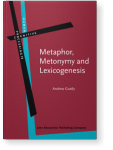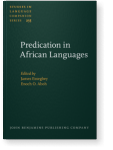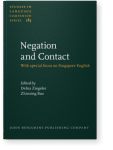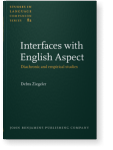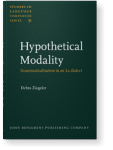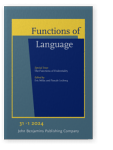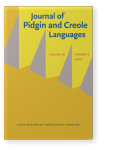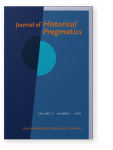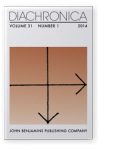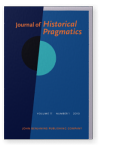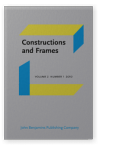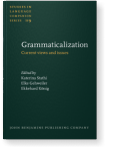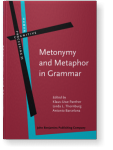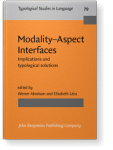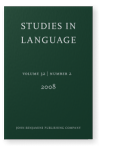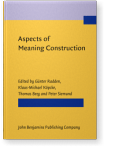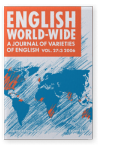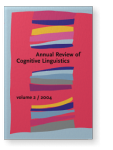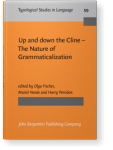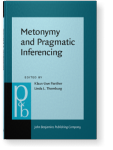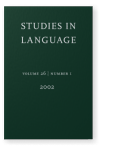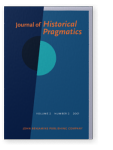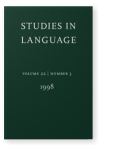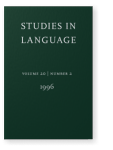Debra Ziegeler
List of John Benjamins publications for which Debra Ziegeler plays a role.
Book series
Titles
Negation and Contact: With special focus on Singapore English
Edited by Debra Ziegeler and Zhiming Bao
[Studies in Language Companion Series, 183] 2017. vii, 208 pp.
Subjects English linguistics | Semantics | Syntax | Theoretical linguistics
Interfaces with English Aspect: Diachronic and empirical studies
Debra Ziegeler
[Studies in Language Companion Series, 82] 2006. xvi, 325 pp.
Subjects English linguistics | Germanic linguistics | Historical linguistics | Semantics | Syntax | Theoretical linguistics
Hypothetical Modality: Grammaticalisation in an L2 dialect
Debra Ziegeler
[Studies in Language Companion Series, 51] 2000. xx, 287 pp.
Subjects Historical linguistics | Sociolinguistics and Dialectology | Theoretical linguistics
2024 On the co-optation of according to as an evidential in English The Functions of Evidentiality, Mélac, Eric and Pascale Leclercq (eds.), pp. 16–33 | Article
The use of according to + NP has rarely been the topic of any specialized research in relation to English evidentiality, although it would probably figure among the most frequent types of reportative evidentials found in written texts. One of the problems often associated with reportatives has… read more
2020 Changes in the functions of already in Singapore English: A grammaticalization approach Journal of Pidgin and Creole Languages 35:2, pp. 293–331 | Article
The use of the adverb already in Colloquial Singapore English has long been known as one of the most readily recognizable features defining the contact dialect, marking aspectual nuances such as anterior, completive, inchoative and inceptive functions, as noted by Bao (2005, 2015). Recent… read more
2017 Quantification under negative scope in Singapore English Negation and Contact: With special focus on Singapore English, Ziegeler, Debra and Zhiming Bao (eds.), pp. 171–206 | Article
Earlier studies on the grammatical system of Singapore English have attributed little attention to the interactions between negation and quantification, and even less researched in previous studies is the application of the Aristotelian Square of Oppositions to variational data from international… read more
2017 Introduction Negation and Contact: With special focus on Singapore English, Ziegeler, Debra and Zhiming Bao (eds.), pp. 1–10 | Article
2016 Intersubjectivity and the diachronic development of counterfactual almost Journal of Historical Pragmatics 17:1, pp. 1–25 | Article
Former studies have attributed little attention to the historical factors surrounding the development of counterfactual meanings in almost, though some refer to evidence of expletive negation found in proximatives crosslinguistically. In this study, the historical development of the adverb will… read more
2014 Replica grammaticalisation as recapitulation: The other side of contact Diachronica 31:1, pp. 106–141 | Article
The study of replica grammaticalisation in contact (Heine & Kuteva 2003, 2005) has not been without its critics (e.g. Matthews & Yip 2009, Gast & van der Auwera 2012) because of assumptions of a historical linguistic awareness of model language grammaticalisation routes. In Heine & Kuteva’s… read more
2010 Semantic determinism and the grammaticalisation of have to in English: A reassessment Journal of Historical Pragmatics 11:1, pp. 32–66 | Article
The traditionally held view that grammaticalisation should be a semantically-motivated process (as discussed, for example, in Hopper and Traugott 2003: 75, summarising Bybee 1985; Bybee and Dahl 1989; Heine, Claudi and Hünnemeyer 1991; Heine et al. 1993; and Heine and Kuteva 2002) has not been… read more
2010 Count-mass coercion, and the perspective of time and variation Constructions and Frames 2:1, pp. 33–73 | Article
In an earlier study (Ziegeler 2007), it was emphasised that it was redundant to discuss construction coercion in the face of more transparent mechanisms of cognitive pragmatics such as metonymy, and within the sphere of grammaticalisation studies. The present paper extends such arguments,… read more
2010 What grammaticalisation can reveal about same-subject control Grammaticalization: Current views and issues, Stathi, Katerina, Elke Gehweiler and Ekkehard König (eds.), pp. 241–272 | Article
The notion of an implicit infinitive subject for non-finite clauses has increasingly shifted from the focus of syntactic research to that of semantics. The present study addresses some examples from Colloquial Singaporean English (CSE) in which subject control relations appear to be absent. It is… read more
2009 A metonymic analysis of Singaporean and Malaysian English causative constructions Metonymy and Metaphor in Grammar, Panther, Klaus-Uwe, Linda L. Thornburg and Antonio Barcelona (eds.), pp. 291–322 | Article
2008 Propositional aspect and the development of modal inferences in English Modality–Aspect Interfaces: Implications and typological solutions, Abraham, Werner and Elisabeth Leiss (eds.), pp. 43–79 | Article
The alignment of deontic modality with perfective lexical aspect and epistemic modality with imperfective lexical aspect has been observed in a number of recent publications on the interface between aspect and modality (e.g., Abraham 1998, 2000, 2002, 2003). The present study considers the way in… read more
2008 Review of Frawley (2006): The Expression of Modality Studies in Language 32:2, pp. 466–475 | Review
2007 Arguing the case against coercion Aspects of Meaning Construction, Radden, Günter, Klaus-Michael Köpcke, Thomas Berg and Peter Siemund (eds.), pp. 99–123 | Article
Recent work in cognitive linguistics has hired the term coercion which was formerly associated with computational linguistics to apply to a number of instances in the study of natural language in which there is an incongruity between the semantics of a syntactic frame and the semantics of lexical… read more
2006 Causativity reduction in Singaporean English English World-Wide 27:3, pp. 265–294 | Article
A common feature of Singaporean English, and found to a lesser extent in British and US English, is the “conventionalised scenario” (Goldberg 1995); i.e. a causative construction in which an intermediate causee is neither expressed nor necessarily recoverable from context and common ground, e.g.… read more
2004 Grammaticalisation through constructions: The story of causativehavein English Annual Review of Cognitive Linguistics: Volume 2, Ruiz de Mendoza Ibáñez, Francisco José (ed.), pp. 159–195 | Article
Recent arguments by Langacker (2003) on the nature of verb meanings in constructions claim that such meanings are created by entrenchment and frequency of use, and only with repeated use can they become conventionalised and acceptable. Such a position raises the need for a diachronic perspective on… read more
2004 Redefining unidirectionality: Is there life after modality? Up and down the Cline – The Nature of Grammaticalization, Fischer, Olga, Muriel Norde and Harry Perridon (eds.), pp. 115–135 | Article
2003 The development of counterfactual implicatures in English: A case of metonymy or M-inference? Metonymy and Pragmatic Inferencing, Panther, Klaus-Uwe and Linda L. Thornburg (eds.), pp. 169–203 | Article
2001 Past ability modality and the derivation of complementary inferences Journal of Historical Pragmatics 2:2, pp. 273–316 | Article
Levinson (1995) attributes the counterfactual meanings derived from marked, periphrastic alternatives of the modal verb, could, to the presence of M-inferences related to the Gricean maxim of Manner. He accounts for the complementary nature of inferences associated with the two alternates, could… read more
1998 Review of Pütz & Dirven (1996): The Construal of Space in Language and Thought Studies in Language 22:3, pp. 729–739 | Review
1996 A Synchronic Perspective on the Grammaticalisation of will in Hypothetical Predicates Studies in Language 20:2, pp. 411–442 | Article
Current works on grammaticalisation have discussed the tendency for older, lexically-based meanings to continue to adhere to the grammaticalising item in a situation described as 'retention' (Bybee & Pagliuca, 1987), and for these meanings to impose semantic constraints affecting the grammatical… read more
